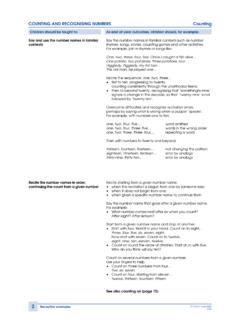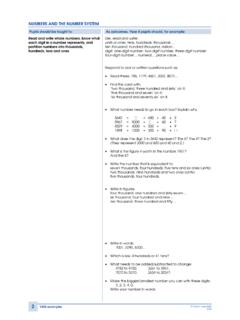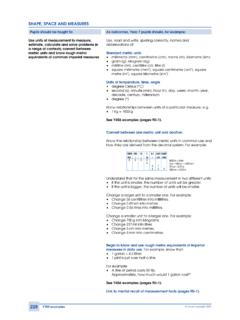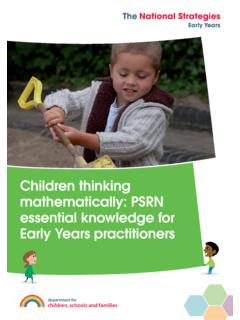Transcription of Adult Numeracy core curriculum - Count On
1 core curriculumAdult Numeracycore curriculumAdult NumeracyiiThe Adult Numeracy core CurriculumAcknowledgementsThe Basic Skills Agency would like to thank the following for their contribution to thedevelopment of the core curriculum :Martin Good, Cambridge Training and Development Hollin, Cambridge Training and Development Simpson, Education ConsultantAndrew Steeds, Consultant and EditorLinda Horne, ConsultantLynn Tranter, Cambridge University School of EducationKaren Davies, Business and Education ConsultancyMadeleine Held, London Language and literacy UnitSarah Oliver, ConsultantNoyona Chanda, London Language and literacy UnitSuzanne Overton-Edwards, The College of North East Londonand from the Basic Skills Agency:Jim PatemanGay LobleySarah Basic Skills Agency would also like to thank those organisations and individualswho responded to the consultation on the draft curriculum and, in particular, the FurtherEducation Development Agency (FEDA) and the Qualifications and curriculum Authority(QCA) for their detailed responses.
2 The Basic Skills Agency 2001 Produced by Cambridge Training and Development Ltd. on behalf of the Basic Skills Agency, Commonwealth House, 1 19 New Oxford Street, London WC1A : Studio 21 Editor: Andrew SteedsReproduction, storage, adaptation or translation, in any form or by any means, of this publication is prohibited withoutprior written permission of the publisher, unless within the terms of licences issued by the Copyright LicensingAgency. Excerpts may be reproduced for the purpose of research, private study, criticism or review, or by educationalinstitutions solely for educational purposes, without permission, provided full acknowledgement is 1-85990-128-XContentsiiiContentsForeword by Malcolm Wicks MP, Minister for Lifelong LearningvIntroductionThe core curriculum1 The national standards for Adult literacy and numeracy3 The national qualifications framework4 Who are the learners?5 Using the core curriculum6 The Numeracy core CurriculumThe progression between capabilities12 Number: the progression between curriculum elements14 Measures, shape and space: the progression between curriculum elements16 Handling data: the progression between curriculum elements18 Number20 Measures, shape and space48 Handling data74 Glossary88 References93 ForewordvForewordImproving the nation s literacy and Numeracy skills is one ofthe Government s top priorities.
3 We have already broughtabout significant improvements at school level and want toensure that adults have good opportunities to develop theirskills too. We are in the process of introducing a range ofnew measures to help them. One of our first tasks is to improve the quality andconsistency of provision. This new Adult literacy andnumeracy curriculum , based on the national standardsdeveloped by the Qualifications and curriculum Authority, will be central to achievingthat goal. It provides teachers with a comprehensive framework to help identify and meet eachperson s individual learning needs, including examples of teaching strategies they canuse. For learners, it will ensure that, no matter which type of course they choose orwhere the learning takes place, they can be confident of a common approach andeffective am sure that this curriculum will prove an invaluable tool. It is designed primarily foradult literacy and Numeracy teachers and tutors, but it will also be highly useful toprogramme managers, developers of literacy and Numeracy training and materials, and tothe growing body of organisations and individuals involved in addressing Adult literacyand Numeracy Wicks MP, Minister for Lifelong LearningThe Adult Basic SkillsNumeracy core CurriculumIntroduction1 IntroductionA national strategy to tackle the literacy and Numeracy needs of adults was launched bythe government in the Autumn of 2000.
4 Following the report of Sir Claus Moser s WorkingGroup, A Fresh Start Improving literacy and Numeracy (DfEE, 1999), the governmentcommitted itself, the education services and a cross-section of agencies and nationalbodies to a major reduction in the number of adults who struggle with basic reading,writing, spelling and strategy includes national standards of Adult literacy and Numeracy to ensureconsistency, a core curriculum to clarify what teachers should teach to enable learners to reach those standards, a new system of qualifications to measureachievement against the standards, and improved quality and diversity of learningopportunities to meet the needs of a wide range of learners. This strategy sets achallenge to us Adult literacy and Numeracy core curriculumThe new Adult literacy and Numeracy core curriculum is central to the national sets out the entitlement to learning for all adults who have difficulties with literacyand Numeracy .
5 It describes the content of what should be taught in literacy andnumeracy programmes in: further and Adult education; the workplace and programmesfor the unemployed; prisons; community-based and family literacy and numeracyprogrammes. It assists teachers to meet the individual needs of adults through theselection and teaching of skills appropriate to those adults needs. For the first time, adults and the teachers who work with them have a clear set of skills required to meetnational standards, together with the knowledge and understanding that underpin thoseskills, supported by sample strategies to develop core curriculum has been written primarily for use by Adult literacy and numeracyteachers and tutors. However, it will be an important document for programme managersand developers, for those involved in research and for a wider group of those bodies andindividuals that are increasingly concerned with the Adult literacy and Numeracy agenda.
6 The core curriculum is based on the national standards for Adult literacy and numeracydeveloped by the Qualifications and curriculum Authority (QCA) in 2000. Its publicationfollows national consultation with teachers and managers of Adult literacy and numeracyprogrammes, and relevant national bodies. The core curriculum draws heavily on existingand planned curricula and strategies in this country and overseas, specifically: the twin frameworks for teaching literacy and Numeracy that are elaborated inthe National literacy Strategy and the National Numeracy Strategy; the new key skills units of communication and application of numberdeveloped by QCA; the revised National curriculum for English and mathematics introduced inschools in September 2000; One of the crucialelements of theproposed strategy mustbe clarity about theskills, knowledge andunderstanding thatanyone needs to beliterate and numerate inthe modern skills need to beenshrined in a newcurriculum, with well-developed andunderstood standards.
7 Chapter 10 (A New BasicSkills curriculum and aNew System ofQualifications), A FreshStart,February 19992 The Adult Numeracy core curriculum Adult literacy and Numeracy curricula and initiatives that have been developedin other countries (and, in particular, in the United States of America, Australia,Canada and France).As the national strategy unfolds, the core curriculum will be reviewed and updated to buildin new and revised ways of delivering these skills in order to fulfil the vision outlined in AFresh teachers, therefore, the new core curriculum is both a key support and alsoa literacy and Numeracy teachers will be able to use the core curriculum to developlearning programmes. It will help them to: use information from diagnostic assessment to identify learners skills, boththose that they already have and those that they need; draw those elements from the curriculum into the learning plan andassessment regime; use their knowledge of the learners context and priorities to find relevantapplications where learners can practise the skills and knowledge they areacquiring; follow the progression through the standards and the curriculum elementsto build a formative and summative assessment regime into the learning and accessThe Adult literacy and Numeracy core curriculum shares the basic principles of inclusivityand access that are laid down in the National curriculum for schools: Education is.
8 A route to equality of opportunity for all, a healthy and justdemocracy, a productive economy, and sustainable development. Educationshould reflect the enduring values that contribute to these ends. These includevaluing ourselves, our families and other relationships, the wider groups to whichwe belong, the diversity in our society and the environment in which we live.. (Education) must enable us to respond positively to the opportunities andchallenges of the rapidly changing world in which we live and work. In particular,we need to be prepared to engage as individuals, parents, workers and citizenswith economic, social and cultural change, including the continued globalisationof the economy and society, with new work and leisure patterns and with therapid expansion of communication .. curriculum secures .. for all, irrespective of social background, culture,race, gender, differences in ability and disabilities, an entitlement to a number ofareas of learning and to develop knowledge, understanding, skills and attitudesnecessary for their self-fulfilment and development as active and responsiblecitizens.
9 ( The school curriculum and the National curriculum : values, aims and purposes ,The National curriculum , DfEE, 1999) As far as possible thecurriculum should becontext free the coreshould set out the skillsto be taught. Thecontext in which theyare taught is a matterfor the teacher andlearner to decide,particularly as differentadults have differentmotivations A Fresh Start,February 1999 Introduction3 Some adults will have special requirements. The following access statementapplies to the standards at each level: adults with a disability may have special learning requirements and be unableto demonstrate some of the capabilities or skills specified in the a reasonable adjustment and to aid access, it is recommended thatalternative methods are investigated to allow individual to demonstrate developers and qualification designers are expected to produceguidance for centres on recognising special learning requirements. Thisguidance should be supported by a framework for identifying and adoptingappropriate alternative approaches.
10 ( Access to the Standards , National standards for Adult literacy and Numeracy ,QCA, 2000)Guidance on specialist diagnosis of learning needs and access to the curriculum forlearners with physical disabilities, sensory impairment and learning disabilities will bepublished separately. The national standards for Adult literacy and numeracyThe standards describe Adult literacy and Numeracy within the definition expressed inA Fresh Start: the ability to read, write and speak in English and to use mathematics at alevel necessary to function at work and in society in general. The standards provide a map of the range of skills and capabilities that adults areexpected to need in order to function and progress at work and in society. A separate setof standards has been produced for each of the basic skills of literacy and the ability to: speak, listen and respond read and comprehend write to the ability to: understand and use mathematical information calculate and manipulate mathematical information interpret results and communicate mathematical curricula have been developed and published for literacy and for Adult Numeracy core CurriculumTable 1.









